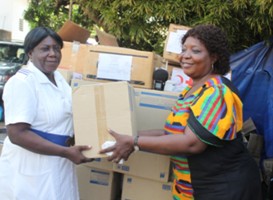Six Years of CARMMA: restoring gains in health service delivery
March 22, 2016 By Ahmed Sahid Nasralla (De Monk)
The Ebola outbreak in Sierra Leone had an adverse effect on the health sector, with gains achieved in the implementation of the Campaign on Accelerated Reduction of Maternal Mortality (CARMMA) suffering a set-back as most women were afraid of accessing reproductive health care services.
Restoring such gains made over the years in maternal and infant mortality reduction initiatives is therefore a key post-Ebola objective in the three Ebola-affected countries of Liberia, Guinea and Sierra Leone.
CARMMA @ 6
In Sierra Leone, to mark the sixth year of the CARMMA initiative, the Office of the First Lady (OFL) is collaborating with the Ministry of Health and Sanitation (MoHS), UNFPA, PPASL and Marie Stopes Sierra Leone to host a one day meeting at the Bo government Hospital on the 22nd March 2016 with a focus on enhancing institutional delivery, increasing family planning services and cervical cancer awareness. Partners such as Marie Stopes Sierra Leone and PPASL will provide free family planning services on that day. The OFL will take the lead, with support from UNFPA and MoHS, in restoring the confidence of pregnant women to access reproductive health services.

 This ten year global plan for measles and rubella outlines the strategy that needs to be fully implemented to achieve the measles and rubella goals endorsed by the World Health Assembly. The plan sets out the: vision, goals and targets for the 2011-2020 period, recommended strategies, guiding principles, priorities, costing of reaching the targets, and the challenges as well as ways to overcome them. The plan incorporates the lessons learnt from 10 years experience in measles and rubella accelerated control and elimination and is jointly developed by the Measles Initiative which is spearheaded by the American Red Cross, US Centers for Disease Control and Prevention (CDC), United Nations Foundation, UNICEF and World Health Organization.
This ten year global plan for measles and rubella outlines the strategy that needs to be fully implemented to achieve the measles and rubella goals endorsed by the World Health Assembly. The plan sets out the: vision, goals and targets for the 2011-2020 period, recommended strategies, guiding principles, priorities, costing of reaching the targets, and the challenges as well as ways to overcome them. The plan incorporates the lessons learnt from 10 years experience in measles and rubella accelerated control and elimination and is jointly developed by the Measles Initiative which is spearheaded by the American Red Cross, US Centers for Disease Control and Prevention (CDC), United Nations Foundation, UNICEF and World Health Organization.





Recent Comments